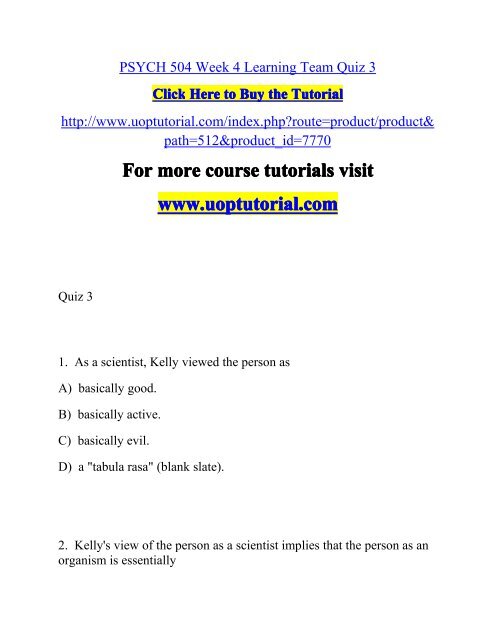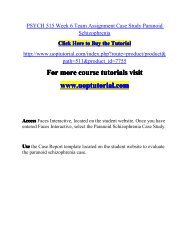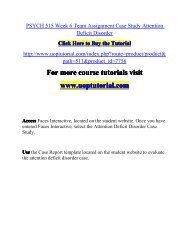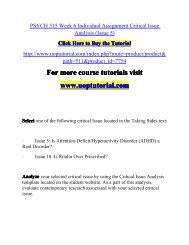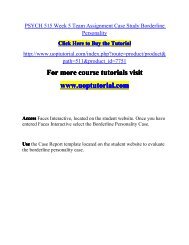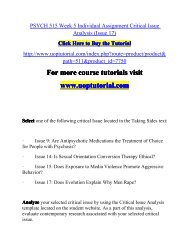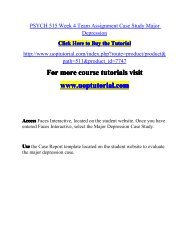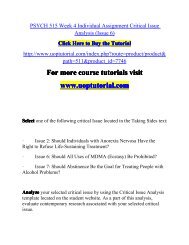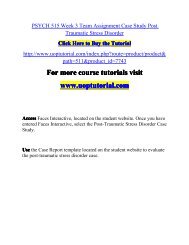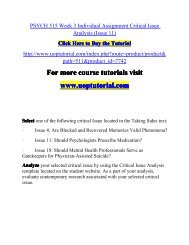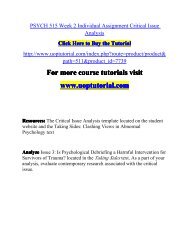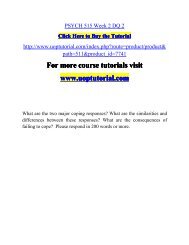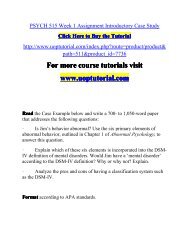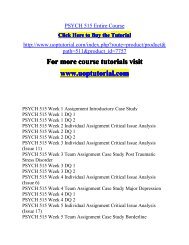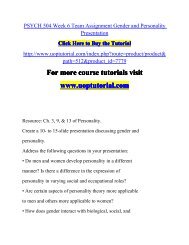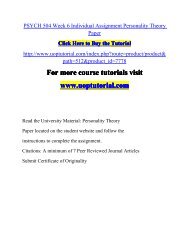PSYCH 504 Week 4 Learning Team Quiz 3
Quiz 3 1. As a scientist, Kelly viewed the person as A) basically good. B) basically active. C) basically evil. D) a "tabula rasa" (blank slate). 2. Kelly's view of the person as a scientist implies that the person as an organism is essentially A) always trying to understand the present through an evaluation of the past. B) always trying to understand the present through an evaluation of the present. C) always trying to understand the past through an evaluation of the future. D) always trying to understand the future through an evaluation of the present. 3. Within Kelly's cognitive theory of personality, the term "constructive alternativism" means A) we have the ability to seek objective reality in many alternative ways. B) when we are limited by objective reality we have the ability to express ourselves in alternative ways. C) there is no objective reality - only alternative ways of constructing events. D) none of the above. 4. People have many different notions about what the goals of science are. Kelly felt that the goal of science is A) the development of construct systems that are helpful in anticipating events. B) the discovery of truth. C) the uncovering of things heretofore unknown. D) none of the above. 5. Kelly suggested that a problem with psychologists is A) they do not assume people act on the same basis they do. B) they believe in absolute truths. C) they reject the value of subjective, personal knowledge. D) all of the above. 6. According to Kelly we are A) free. B) determined. C) victims of the past or present. D) depends on our construction of things. 7. According to Kelly, a theory has A) reliability and validity. B) loose and tight constructs. C) a range of convenience and a focus of convenience. D) all of the above. 8. For Kelly, theories are A) part of the discovery of truth. B) valid or invalid. C) modifiable. D) maintained until an inaccurate prediction. 9. The value of constructs is that they A) help us to gratify our instincts. B) help us to impose order and regularity on the world. C) are associated with affect and motivation. D) all of the above. 10. According to Kelly, a construct A) always has two poles. B) is not always verbal. C) both (a) and (b). D) neither (a) nor (b).
Quiz 3
1. As a scientist, Kelly viewed the person as
A) basically good.
B) basically active.
C) basically evil.
D) a "tabula rasa" (blank slate).
2. Kelly's view of the person as a scientist implies that the person as an organism is essentially
A) always trying to understand the present through an evaluation of the past.
B) always trying to understand the present through an evaluation of the present.
C) always trying to understand the past through an evaluation of the future.
D) always trying to understand the future through an evaluation of the present.
3. Within Kelly's cognitive theory of personality, the term "constructive alternativism" means
A) we have the ability to seek objective reality in many alternative ways.
B) when we are limited by objective reality we have the ability to express ourselves in alternative ways.
C) there is no objective reality - only alternative ways of constructing events.
D) none of the above.
4. People have many different notions about what the goals of science are. Kelly felt that the goal of science is
A) the development of construct systems that are helpful in anticipating events.
B) the discovery of truth.
C) the uncovering of things heretofore unknown.
D) none of the above.
5. Kelly suggested that a problem with psychologists is
A) they do not assume people act on the same basis they do.
B) they believe in absolute truths.
C) they reject the value of subjective, personal knowledge.
D) all of the above.
6. According to Kelly we are
A) free.
B) determined.
C) victims of the past or present.
D) depends on our construction of things.
7. According to Kelly, a theory has
A) reliability and validity.
B) loose and tight constructs.
C) a range of convenience and a focus of convenience.
D) all of the above.
8. For Kelly, theories are
A) part of the discovery of truth.
B) valid or invalid.
C) modifiable.
D) maintained until an inaccurate prediction.
9. The value of constructs is that they
A) help us to gratify our instincts.
B) help us to impose order and regularity on the world.
C) are associated with affect and motivation.
D) all of the above.
10. According to Kelly, a construct
A) always has two poles.
B) is not always verbal.
C) both (a) and (b).
D) neither (a) nor (b).
Create successful ePaper yourself
Turn your PDF publications into a flip-book with our unique Google optimized e-Paper software.
<strong>PSYCH</strong> <strong>504</strong> <strong>Week</strong> 4 <strong>Learning</strong> <strong>Team</strong> <strong>Quiz</strong> 3Click Here to Buy the Tutorialhttp://www.uoptutorial.com/index.php?route=product/product&path=512&product_id=7770For more course tutorials visitwww.uoptutorial.com<strong>Quiz</strong> 31. As a scientist, Kelly viewed the person asA) basically good.B) basically active.C) basically evil.D) a "tabula rasa" (blank slate).2. Kelly's view of the person as a scientist implies that the person as anorganism is essentially
A) always trying to understand the present through an evaluation of thepast.B) always trying to understand the present through an evaluation of thepresent.C) always trying to understand the past through an evaluation of thefuture.D) always trying to understand the future through an evaluation of thepresent.3. Within Kelly's cognitive theory of personality, the term "constructivealternativism" meansA) we have the ability to seek objective reality in many alternative ways.B) when we are limited by objective reality we have the ability toexpress ourselves in alternative ways.C) there is no objective reality - only alternative ways of constructingevents.D) none of the above.4. People have many different notions about what the goals of scienceare. Kelly felt that the goal of science isA) the development of construct systems that are helpful in anticipatingevents.
B) the discovery of truth.C) the uncovering of things heretofore unknown.D) none of the above.5. Kelly suggested that a problem with psychologists isA) they do not assume people act on the same basis they do.B) they believe in absolute truths.C) they reject the value of subjective, personal knowledge.D) all of the above.6. According to Kelly we areA) free.B) determined.C) victims of the past or present.D) depends on our construction of things.7. According to Kelly, a theory hasA) reliability and validity.
B) loose and tight constructs.C) a range of convenience and a focus of convenience.D) all of the above.8. For Kelly, theories areA) part of the discovery of truth.B) valid or invalid.C) modifiable.D) maintained until an inaccurate prediction.9. The value of constructs is that theyA) help us to gratify our instincts.B) help us to impose order and regularity on the world.C) are associated with affect and motivation.D) all of the above.10. According to Kelly, a constructA) always has two poles.
B) is not always verbal.C) both (a) and (b).D) neither (a) nor (b).


